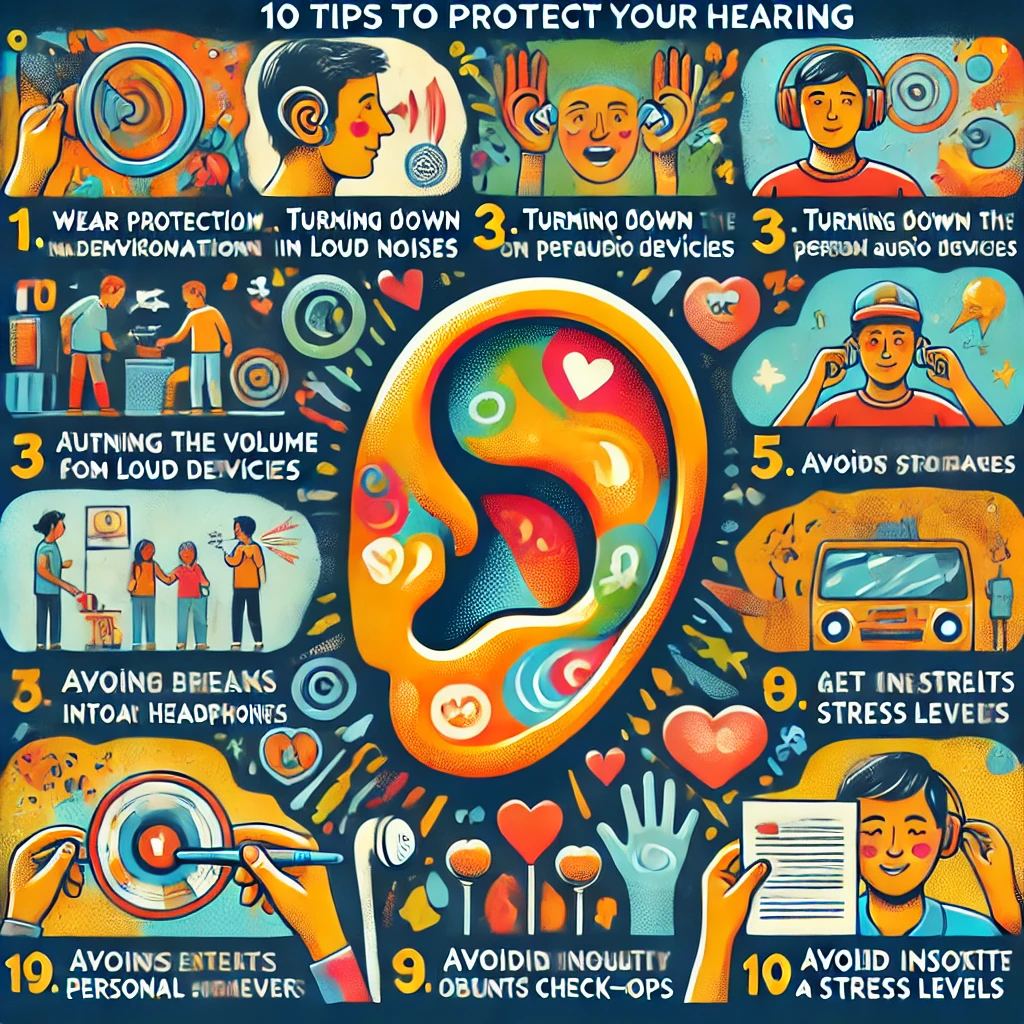Table of Contents
Introduction
Hook
Our ability to hear is a precious gift that enables us to communicate, enjoy music, and be aware of our surroundings. Yet, hearing is often taken for granted until it’s compromised. Hearing loss can significantly impact one’s quality of life, making it crucial to understand how to protect this vital sense. 10 tips to protect your hearing
Statistics
According to the World Health Organization, over 1.5 billion people globally live with some degree of hearing loss. This number is expected to rise, making hearing protection more important than ever. In the United States alone, approximately 48 million people have significant hearing loss. These statistics highlight the need for increased awareness and proactive measures to safeguard our hearing.
Thesis Statement
This article aims to provide practical tips for protecting your hearing. By understanding the causes of hearing loss and adopting preventive measures, you can maintain your hearing health and enhance your quality of life.
Understanding Hearing Loss
Types of Hearing Loss
Hearing loss can be classified into three main types: conductive, sensorineural, and mixed. 10 tips to protect your hearing
- Conductive Hearing Loss: This type occurs when sound waves are not properly conducted through the outer ear canal to the eardrum and the tiny bones (ossicles) of the middle ear. Common causes include ear infections, fluid in the middle ear, earwax buildup, and structural problems with the ear canal or eardrum.
- Sensorineural Hearing Loss: This type is due to damage to the inner ear (cochlea) or to the nerve pathways from the inner ear to the brain. It is the most common type of permanent hearing loss. Causes include aging, exposure to loud noise, head trauma, viruses, autoimmune diseases, and genetic factors.
- Mixed Hearing Loss: This type involves both conductive and sensorineural hearing loss. It can occur when there is damage in both the outer or middle ear and in the inner ear or auditory nerve.
Understanding the type of hearing loss is crucial for determining the appropriate treatment and prevention strategies.
Common Causes of Hearing Loss
Hearing loss can result from a variety of factors. Here are some of the most common causes:
- Exposure to Loud Noises: Prolonged exposure to loud noises, such as machinery, concerts, or headphones at high volume, can damage the hair cells in the inner ear, leading to hearing loss.
- Aging: Age-related hearing loss, known as presbycusis, occurs gradually as we grow older. It typically affects both ears and involves the deterioration of the inner ear structures and auditory nerve.
- Ear Infections and Medical Conditions: Chronic ear infections can cause fluid buildup and damage the ear structures, leading to conductive hearing loss. Medical conditions such as diabetes and high blood pressure can also impact hearing.
- Ototoxic Medications: Some medications, including certain antibiotics, chemotherapy drugs, and high doses of aspirin, can be ototoxic, meaning they can damage the inner ear and lead to hearing loss.
Tips to Protect Your Hearing
Limit Exposure to Loud Noises
Exposure to loud noises is one of the leading causes of hearing loss. Understanding safe sound levels is crucial for protecting your hearing. Sounds are measured in decibels (dB), and exposure to noises above 85 dB can cause hearing damage over time.
Use Ear Protection
Using ear protection is essential in environments where loud noises are unavoidable. Earplugs and earmuffs are effective tools for reducing noise exposure. Custom-molded earplugs offer better comfort and protection for frequent use.
Maintain a Safe Volume on Personal Devices
Listening to music or podcasts at high volumes on personal devices can cause hearing damage. It’s important to keep the volume at a safe level and use noise-canceling headphones to reduce the need for higher volumes in noisy environments.
Take Listening Breaks
Continuous exposure to loud noises can strain your ears. Taking regular listening breaks allows your ears to recover and reduces the risk of hearing damage. Follow the 60/60 rule: listen at 60% volume for no more than 60 minutes at a time.
Avoid Inserted Objects into Ears
Inserting objects like cotton swabs into your ears can push earwax further in and damage the ear canal. Instead, clean your ears with a damp cloth and avoid inserting anything into the ear canal.
Regular Hearing Check-ups
Regular hearing check-ups can detect hearing issues early and help in managing them effectively. Adults should have their hearing tested every few years, while those exposed to loud noises regularly should get tested annually.
Maintain a Healthy Lifestyle
A healthy lifestyle contributes to overall well-being, including hearing health. A balanced diet rich in vitamins and minerals supports inner ear function. Regular exercise improves blood circulation, which is vital for healthy ears.
Manage Stress
Chronic stress can affect hearing by contributing to conditions like tinnitus (ringing in the ears). Managing stress through relaxation techniques, exercise, and adequate sleep can help protect your hearing.
Be Aware of Ototoxic Medications
Certain medications can be harmful to your hearing. If you’re prescribed medication, ask your doctor about potential ototoxic effects and explore alternative treatments if necessary.
Protect Ears During Activities
Activities like swimming and flying can expose your ears to pressure changes and water, which can affect hearing. Use earplugs when swimming and practice techniques to equalize ear pressure during flights.
Special Considerations
Protecting Children’s Hearing
Children’s ears are more sensitive to loud noises. Protect their hearing by limiting their exposure to loud sounds and using appropriate ear protection during noisy activities.
Hearing Protection for Musicians
Musicians are at high risk of hearing loss due to prolonged exposure to loud music. They should use specialized ear protection, such as musician’s earplugs, to reduce sound levels without compromising sound quality.
Conclusion
Protecting your hearing is crucial for maintaining your quality of life. By following these tips, you can prevent hearing loss and enjoy better hearing health.
10 tips to protect your hearing For More: https://earbuddy.in/is-it-bad-to-use-your-earbuds-everyday/

